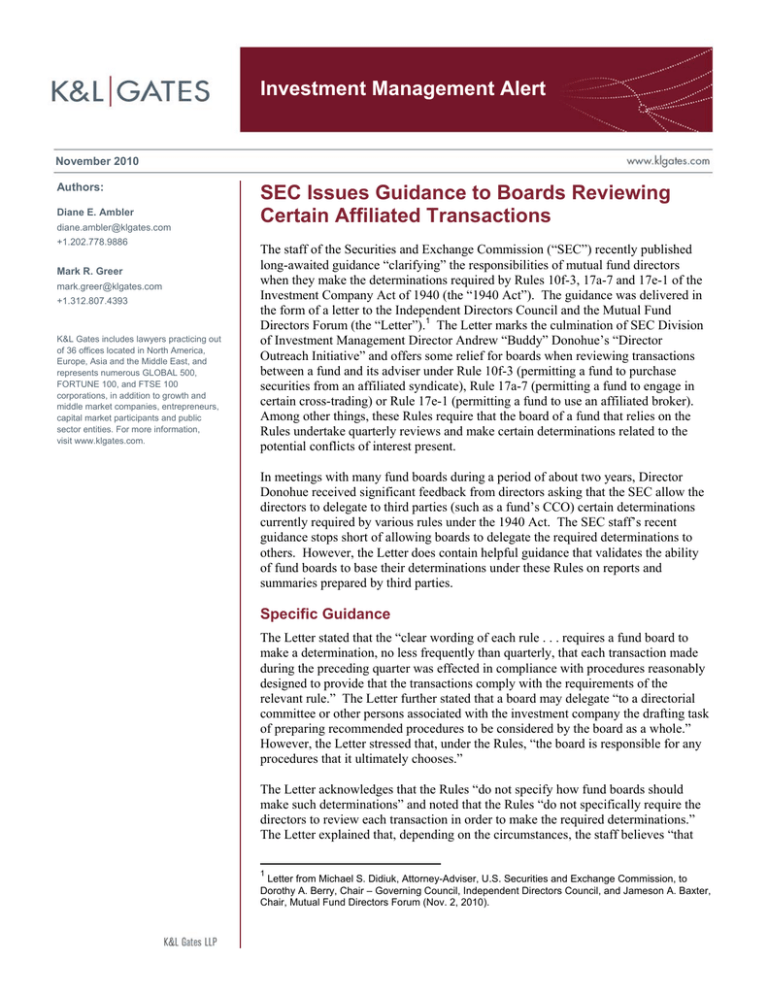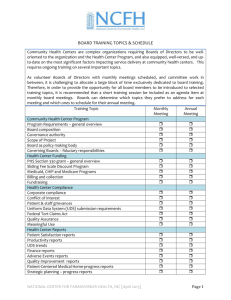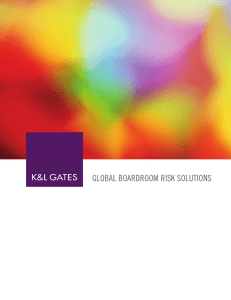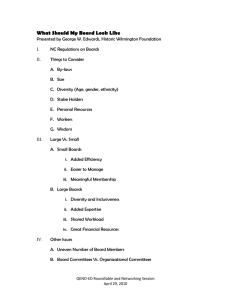
Investment Management Alert
November 2010
Authors:
Diane E. Ambler
diane.ambler@klgates.com
+1.202.778.9886
Mark R. Greer
mark.greer@klgates.com
+1.312.807.4393
K&L Gates includes lawyers practicing out
of 36 offices located in North America,
Europe, Asia and the Middle East, and
represents numerous GLOBAL 500,
FORTUNE 100, and FTSE 100
corporations, in addition to growth and
middle market companies, entrepreneurs,
capital market participants and public
sector entities. For more information,
visit www.klgates.com.
SEC Issues Guidance to Boards Reviewing
Certain Affiliated Transactions
The staff of the Securities and Exchange Commission (“SEC”) recently published
long-awaited guidance “clarifying” the responsibilities of mutual fund directors
when they make the determinations required by Rules 10f-3, 17a-7 and 17e-1 of the
Investment Company Act of 1940 (the “1940 Act”). The guidance was delivered in
the form of a letter to the Independent Directors Council and the Mutual Fund
Directors Forum (the “Letter”).1 The Letter marks the culmination of SEC Division
of Investment Management Director Andrew “Buddy” Donohue’s “Director
Outreach Initiative” and offers some relief for boards when reviewing transactions
between a fund and its adviser under Rule 10f-3 (permitting a fund to purchase
securities from an affiliated syndicate), Rule 17a-7 (permitting a fund to engage in
certain cross-trading) or Rule 17e-1 (permitting a fund to use an affiliated broker).
Among other things, these Rules require that the board of a fund that relies on the
Rules undertake quarterly reviews and make certain determinations related to the
potential conflicts of interest present.
In meetings with many fund boards during a period of about two years, Director
Donohue received significant feedback from directors asking that the SEC allow the
directors to delegate to third parties (such as a fund’s CCO) certain determinations
currently required by various rules under the 1940 Act. The SEC staff’s recent
guidance stops short of allowing boards to delegate the required determinations to
others. However, the Letter does contain helpful guidance that validates the ability
of fund boards to base their determinations under these Rules on reports and
summaries prepared by third parties.
Specific Guidance
The Letter stated that the “clear wording of each rule . . . requires a fund board to
make a determination, no less frequently than quarterly, that each transaction made
during the preceding quarter was effected in compliance with procedures reasonably
designed to provide that the transactions comply with the requirements of the
relevant rule.” The Letter further stated that a board may delegate “to a directorial
committee or other persons associated with the investment company the drafting task
of preparing recommended procedures to be considered by the board as a whole.”
However, the Letter stressed that, under the Rules, “the board is responsible for any
procedures that it ultimately chooses.”
The Letter acknowledges that the Rules “do not specify how fund boards should
make such determinations” and noted that the Rules “do not specifically require the
directors to review each transaction in order to make the required determinations.”
The Letter explained that, depending on the circumstances, the staff believes “that
1
Letter from Michael S. Didiuk, Attorney-Adviser, U.S. Securities and Exchange Commission, to
Dorothy A. Berry, Chair – Governing Council, Independent Directors Council, and Jameson A. Baxter,
Chair, Mutual Fund Directors Forum (Nov. 2, 2010).
Investment Management Alert
fund boards may, where consistent with the prudent
discharge of their fiduciary duties, make these
determinations in reliance on summary quarterly
reports of the transactions effected in reliance on one
or all of these rules in the prior quarter.” The Letter
outlined various ways a fund board may meet its
responsibilities under these rules:
•
Via review of each transaction. Some boards,
such as “boards to those funds with fewer
transactions[,] may determine to review each
transaction,” though that is not specifically
required.
•
Via compliance officer summaries. Boards
“may decide to make the required
determinations based on summary quarterly
reports (prepared by the fund’s [CCO] or other
designated persons).” The staff added, however,
even if fund boards do not review the details of
each transaction under these rules, “boards
nonetheless should have a process in place
reasonably designed to ensure that transactions
are effected in a manner that is consistent with
the board-approved procedures and the relevant
rules.”
•
Via information from other experts. The staff
stated that “under appropriate circumstances,
fund boards also would have the flexibility to
tap other relevant expertise to assist in the
quarterly review process (e.g., some
combination of fund counsel, counsel to the
independent directors, investment adviser
personnel, and/or independent third parties).”
Avoiding Conflicts
The Letter also emphasized that because of inherent
conflicts of interest between a fund and its adviser
in the context of these rules, “[e]ven if boards rely
on the CCO or others . . . to provide them with
summary quarterly reports . . . boards still retain
ultimate responsibility for making the quarterly
determinations required by these three rules, and
boards cannot delegate such responsibility.”
Stating the staff’s concern that some have
characterized a board’s process in reviewing these
affiliated transactions as “mechanical,” the Letter
cautioned that, “even if the directors rely on others
to investigate the details of each transaction,
[directors] need to be appropriately vigilant to
ensure that they have sufficient information to be
alerted to issues raised by these conflict
transactions.” As such, the Letter stated that “it is
essential that all involved in reviewing these
conflicts transactions and in preparing summary
reports do so diligently.”
The Letter explained that a “particularly important”
aspect of a board’s diligent evaluation of affiliated
transactions is “meaningful dialogue.” A board
“can most effectively manage the conflicts of
interest inherent in these transactions where the
board culture encourages rather than stifles open
and frank discussion of what is in the best interest of
the fund,” the Letter stated.
Anchorage Austin Beijing Berlin Boston Charlotte Chicago Dallas Dubai Fort Worth Frankfurt Harrisburg Hong Kong London
Los Angeles Miami Moscow Newark New York Orange County Palo Alto Paris Pittsburgh Portland Raleigh Research Triangle Park
San Diego San Francisco Seattle Shanghai Singapore Spokane/Coeur d’Alene Taipei Tokyo Warsaw
Washington, D.C.
K&L Gates includes lawyers practicing out of 36 offices located in North America, Europe, Asia and the Middle East, and represents numerous
GLOBAL 500, FORTUNE 100, and FTSE 100 corporations, in addition to growth and middle market companies, entrepreneurs, capital market
participants and public sector entities. For more information, visit www.klgates.com.
K&L Gates comprises multiple affiliated entities: a limited liability partnership with the full name K&L Gates LLP qualified in Delaware and
maintaining offices throughout the United States, in Berlin and Frankfurt, Germany, in Beijing (K&L Gates LLP Beijing Representative Office), in
Dubai, U.A.E., in Shanghai (K&L Gates LLP Shanghai Representative Office), in Tokyo, and in Singapore; a limited liability partnership (also named
K&L Gates LLP) incorporated in England and maintaining offices in London and Paris; a Taiwan general partnership (K&L Gates) maintaining an
office in Taipei; a Hong Kong general partnership (K&L Gates, Solicitors) maintaining an office in Hong Kong; a Polish limited partnership (K&L
Gates Jamka sp.k.) maintaining an office in Warsaw; and a Delaware limited liability company (K&L Gates Holdings, LLC) maintaining an office in
Moscow. K&L Gates maintains appropriate registrations in the jurisdictions in which its offices are located. A list of the partners or members in each
entity is available for inspection at any K&L Gates office.
This publication is for informational purposes and does not contain or convey legal advice. The information herein should not be used or relied upon
in regard to any particular facts or circumstances without first consulting a lawyer.
©2010 K&L Gates LLP. All Rights Reserved.
November 2010
2





